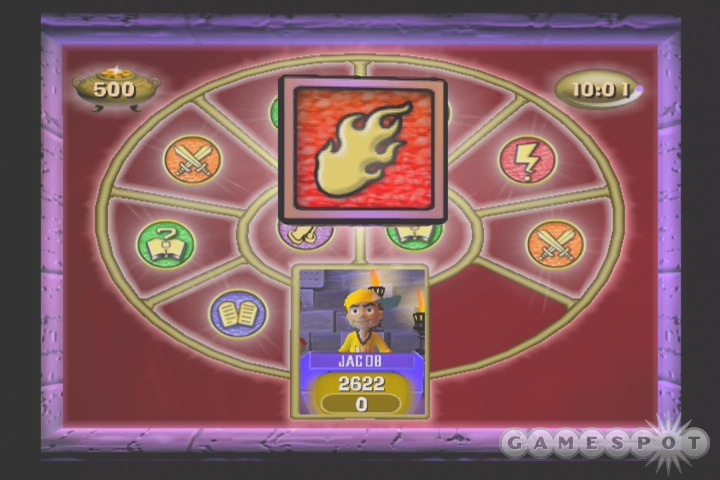Christian-oriented entertainment media continue to grow in popularity in the United States. Novels like the Left Behind series and Christian musical artists like Amy Grant and Creed occasionally even find their way into mainstream pop charts. It was only a matter of time before religiously oriented games entered the market. If The Bible Game is any indication though, it may be a while before these types of religious games have the same kind of impact in the game industry. This party game is functionally similar to a lot of others on the market, but a lack of fun or variety in the minigames and brutally difficult (even for those raised in religious households) trivia questions keep it from being a game we'd recommend to most anyone, secular and spiritual alike.

There are two primary game modes in The Bible Game: TV gameshow and challenge games. The latter lets you quickly play any of the minigames, while the former is the primary mode where you and up to three other friends can play in a gameshow called Do Unto Others. Surprisingly, for a game that's otherwise oriented toward Christians, the name of the gameshow is the most prominent New Testament reference in The Bible Game. In our time playing, there were no pictures or references to Jesus Christ at all. The 20 minigames and 1,500 trivia questions are actually all inspired by Old Testament lore, making it possible for those of Judaic upbringing to play without any disadvantage.
The basis for the gameshow is a game board that resembles a stained glass window. Each space on the board is worth a certain number of points. Like the old gameshow Press Your Luck, the player whose turn it is must stop the flashing light as it moves about the board. The player wins that number of points, and then uncovers one of a number of different possible outcomes. One possible outcome is a challenge game where all four players participate in a multiplayer minigame. There are 12 different challenge games, all based on famous Old Testament stories. David & Goliath, for example, has you using slingshots to attack cardboard cutouts of Philistines, which pop up similar to shooting-gallery targets. A moving target of Goliath occasionally flits across the field as well. This game might have been amusing had it not been for the awkward aiming system. Another challenge game mimics Noah's Ark and has you matching portraits of animals along four moving rows of thumbnails.
The most amusing minigame is called Lion's Den, in reference to early Christians who were persecuted by the Romans. You find yourself in the center of a gladiator arena set up as a simple maze. Lions spawn about the maze periodically, and you earn points by luring them over traps scattered around the arena. Each of the four players earns points in the challenge games based upon their performance. Another possible outcome to uncovering a tile on the board is a blessing game, which unlocks a single-player minigame where only the player in control of the board can earn points. Again, these are simple minigames based on typical fare such as Memory, Simon, or Plinko. Like the challenge games, none of the minigames are particularly fun or religiously enlightening. Aside from minigames, you may uncover a commandment square, where you can get bonus points from other players, or a "do unto others" square, which is the reverse and may require you to give points to other players.
Then, of course, there's the trivia square, where all four players can compete to answer a multiple-choice trivia question about the Old Testament. Each player who answers correctly can earn points, but the faster you buzz in, the more points you get. Unfortunately, for those of us who don't keep a Bible on our nightstands, the questions can be very difficult. Once in a while you get an easy one like "Who did God send to Egypt to free the Israelites?" or "Which of the following is not one of the Ten Commandments?" For the most part, though, even at the game's default trivia difficulty (it's set to the easiest), you'll get tough ones like "What did David take from Saul the second time he spared Saul's life?" Out of curiosity, we cranked up the difficulty to the highest possible setting to see what the questions looked like. If you can answer questions like "After returning to Jerusalem, how many years went by before Absalom saw David?" or "To whose house did David take the Ark of God from the house of Abinidab?" then perhaps it's time you applied to the nearest seminary. The game's artificial intelligence is easy to beat up on the challenge games, but unless you're a minister-in-training, you'll probably find yourself at a severe disadvantage on the trivia portions.
Rounds don't end in The Bible Game until one of the contestants has the misfortune of picking the square hiding "the wrath of God." If you pick this square, you lose all of the points you've accrued for that round. It's pretty vengeful stuff, but then again, this is a game based on the Old Testament. After the wrath of God hits, the other players get their points stored away, the game board resets, and the game continues. When a 20-minute timer runs out, the final round of the gameshow begins, which is basically another minigame called Grace of God. In this minigame, each player tries to pick fruit off of the tree of knowledge of good and evil to earn points. If you pick the square hiding the asp holding an apple though, you'll lose all points for that round.

With only a handful of minigames to play, there really isn't a whole lot to The Bible Game. The graphics are pretty basic, with cartoonish-looking characters that animate somewhat oddly both on the gameshow and within the minigames. Many of the minigame screens don't look particularly fancy either, and some, like The Tower of Babel, and Jonah's Whale, look downright primitive. The religious imagery is fairly abundant, but still tastefully unobtrusive. There's some commercial Christian pop that plays during the challenge games, which is pretty good if you're into that kind of music. But it seems oddly out of place in The Bible Game. Perhaps it's because the production quality of the music is quite good, yet the rest of the sound effects, like the creepily excited announcer's voice, are less than inspiring.
If you're not devoutly religious, it's not likely you'll get much out of The Bible Game. Compared to other party games, there isn't much variety to be had in the minigames, which are all pretty standard fare anyway. The difficult trivia portion is also likely to frustrate you, even if you do have a Christian background. It's hard to recommend this game, even to staunchly devout families, because after you strip away the religious imagery and Christian hooks, what's left is a party game framework that isn't all that fun to begin with.